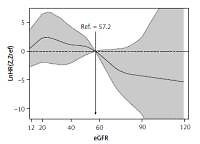Current issue
Archive
Manuscripts accepted
About the Journal
Editorial office
Editorial board
Section Editors
Abstracting and indexing
Subscription
Contact
Ethical standards and procedures
Most read articles
Instructions for authors
Article Processing Charge (APC)
Regulations of paying article processing charge (APC)
CORONARY ARTERY DISEASE / CLINICAL RESEARCH
Coronary revascularization after heart transplant – the search for prognostic factors
1
Department of Interventional Cardiology, Institute of Cardiology, Jagiellonian University Medical College; John Paul II Hospital, Krakow, Poland
2
Department of Cardiovascular Surgery and Transplantology, Institute of Cardiology, Jagiellonian University Medical College, John Paul II Hospital, Krakow, Poland
3
Department of Nephrology, Jagiellonian University Medical College, Krakow, Poland
Submission date: 2017-06-20
Final revision date: 2017-11-06
Acceptance date: 2017-11-08
Online publication date: 2020-04-18
Publication date: 2020-05-26
Arch Med Sci 2020;16(4):789-795
KEYWORDS
TOPICS
ABSTRACT
Introduction:
Survival after heart transplantation (HTX) is extended due to continuous improvement of medical care, allowing enough time for coronary artery vasculopathy to develop. Data on the clinical outcome of cardiac transplantation patients after percutaneous coronary intervention (PCI) are still not extensively explored. The aim of our study was to assess whether heart transplantation itself compromises the outcome in patients undergoing percutaneous coronary intervention and to assess survival rates as well as major cardiovascular complications in heart transplant recipients who had undergone PCI.
Material and methods:
Thirty-three heart transplant recipients who had undergone PCI in the years 2005 to 2015 in a single center were matched by age, sex and main risk factors of arteriosclerosis with 33 controls without heart transplant history. Mean age of patients was 54.6 ±11.4 years in the HTX group and 58.8 ±10.8 years in controls. Median time from heart transplant to PCI was 13 years (4.4–22 years). Case and control groups did not differ in terms of standard risk factors of coronary artery disease, apart from chronic kidney disease, which was present in 70% of patients after heart transplantation, and dyslipidemia, which was present in 91% of control subjects.
Results:
Patients after HTX had worse survival compared to controls (p = 0.04). When adjusted for comorbidities in the Cox regression model, there was no significant difference in survival between cardiac transplant recipients and the control group (HR = 1.06; 95% CI: 0.10–11.24). Chronic renal disease was a significant predictor of all-cause mortality (HR = 29.9; 95% CI: 2.3–393). Considering other endpoints, HTX patients had considerably higher incidence of severe bleeding compared to the control group (27% vs. 3%, p < 0.05).
Conclusions:
There was no significant difference in myocardial infarction rate, revascularization or hospitalization rates.
Survival after heart transplantation (HTX) is extended due to continuous improvement of medical care, allowing enough time for coronary artery vasculopathy to develop. Data on the clinical outcome of cardiac transplantation patients after percutaneous coronary intervention (PCI) are still not extensively explored. The aim of our study was to assess whether heart transplantation itself compromises the outcome in patients undergoing percutaneous coronary intervention and to assess survival rates as well as major cardiovascular complications in heart transplant recipients who had undergone PCI.
Material and methods:
Thirty-three heart transplant recipients who had undergone PCI in the years 2005 to 2015 in a single center were matched by age, sex and main risk factors of arteriosclerosis with 33 controls without heart transplant history. Mean age of patients was 54.6 ±11.4 years in the HTX group and 58.8 ±10.8 years in controls. Median time from heart transplant to PCI was 13 years (4.4–22 years). Case and control groups did not differ in terms of standard risk factors of coronary artery disease, apart from chronic kidney disease, which was present in 70% of patients after heart transplantation, and dyslipidemia, which was present in 91% of control subjects.
Results:
Patients after HTX had worse survival compared to controls (p = 0.04). When adjusted for comorbidities in the Cox regression model, there was no significant difference in survival between cardiac transplant recipients and the control group (HR = 1.06; 95% CI: 0.10–11.24). Chronic renal disease was a significant predictor of all-cause mortality (HR = 29.9; 95% CI: 2.3–393). Considering other endpoints, HTX patients had considerably higher incidence of severe bleeding compared to the control group (27% vs. 3%, p < 0.05).
Conclusions:
There was no significant difference in myocardial infarction rate, revascularization or hospitalization rates.
Share
RELATED ARTICLE
We process personal data collected when visiting the website. The function of obtaining information about users and their behavior is carried out by voluntarily entered information in forms and saving cookies in end devices. Data, including cookies, are used to provide services, improve the user experience and to analyze the traffic in accordance with the Privacy policy. Data are also collected and processed by Google Analytics tool (more).
You can change cookies settings in your browser. Restricted use of cookies in the browser configuration may affect some functionalities of the website.
You can change cookies settings in your browser. Restricted use of cookies in the browser configuration may affect some functionalities of the website.



